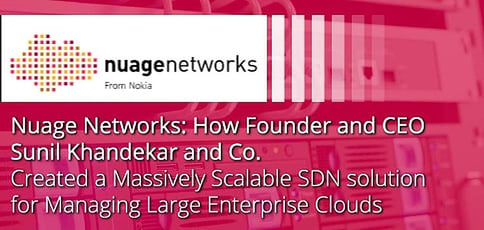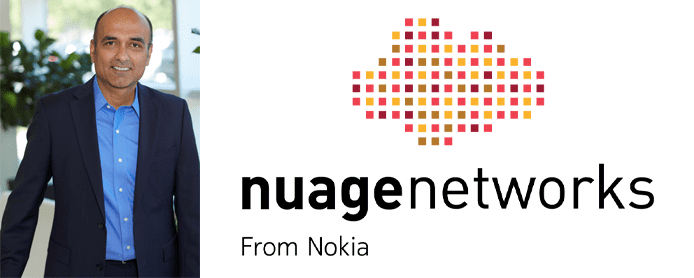
TL; DR: Nuage Networks has been empowering businesses to take full advantage of the cloud since 2013. As part of Nokia, Nuage Networks is a leading provider of software-defined networking (SDN) and software-defined WAN (SD-WAN) solutions offered from a common platform called the virtualized services platform (VSP) built to support both public and private clouds. We recently sat down with Founder and CEO Sunil Khandekar, who told us how Nuage continues to power the hybrid cloud networks of some of the world’s largest organizations, allowing them to operate with agility and better serve their customers.
As the cloud becomes an increasingly hot topic for businesses, the technology behind it continues to evolve. While the traditional approach to cloud computing is suitable for a wide range of business needs, some larger enterprises have recently turned to software-defined networking (SDN) technology for its greater flexibility and performance. SDN creates a more centralized and directly programmable network and simplifies approaches to infrastructure by using open standards that ensure vendor-neutral compatibility.
Since the rise of mobile computing, traffic patterns have shifted away from the traditional north-to-south, client-to-server path to an east-to-west model, where multiple databases and servers may be accessed by a single application. The massive amount of storage, power, and bandwidth necessary to manage this massive amount of data involves hundreds or even thousands of servers working together — often across hundreds of miles.

Founder and CEO Sunil Khandekar told us Nuage Networks aims to help businesses leverage the cloud at scale.
As a result, an increasing number of enterprises are turning to Nuage Networks for its software-defined networking (SDN) solutions. Although SDN has its roots in the enterprise datacenter, its principles have been extended into the WAN to seamlessly connect branch offices. This extension is called SD-WAN and both of these services are offered on the VSP.
“It’s about building large-scale, multi-tenanted networks that help service providers map and scale their VPN connectivity,” said Nuage Founder and CEO Sunil Khandekar.
SDN infrastructure uses virtualization to help these businesses better orchestrate their clouds for increased mobility and easier automation.
Simplifying Multi-Tenant Cloud Management With the Help of Nokia
Before founding Nuage Networks, Sunil was part of an early-2000s startup dedicated to building multi-service servers. Several years later, Sunil and his associates got involved with Alcatel-Lucent, a global provider of telecommunications equipment. Shortly after, Alcatel-Lucent launched Nuage Networks as an internal startup project to create an automated software overlay for the company’s infrastructure. Following Nokia’s 2016 acquisition of Alcatel-Lucent, Nuage Networks officially became part of the telecom giant’s empire.
Sunil’s background in network configuration — combined with the industry’s rapidly growing fascination with the cloud — laid the groundwork for Nuage Networks to become one of the world’s top SDN and SD-WAN providers.
When developing Nuage Networks’ SDN, the team had noticed a number of issues within the corporate cloud, including a lack of mobility and automation.
Sunil told us many of these enterprises had already invested millions of dollars in building their infrastructure. Thus, virtualization at the datacenter level became key to making these networks more versatile.
“It became apparent that, while compute resources were highly dynamic, the connections between those bare-metal servers and virtual workloads were rigid and static,” Sunil said. “In other words, networking hadn’t quite caught on, and none of it was automated. This is where SDN was born to provide automated and programmable networking to complement this rigidity to help scale and operationalize these new networks.”
“What we were providing at the time was not only complete automation within the datacenter, but also flexibility of choice,” Sunil said. “There were no silos, no dependence on the infrastructure underneath, and no dependence on which hypervisor technology you might be using.”
Without the need to completely restructure their networks, enterprises could use Nuage’s SDN regardless of vendor and location, among other normally limiting factors.
Establishing SDN as the Foundation for Cloud Networking & Automation
As a pioneer in the SDN market, Nuage Networks has always been an early adopter of cloud technology trends. Soon after the emergence of Nuage’s VSP, SDN became the gold standard for policy-based cloud automation.
However, SDN was initially met with mild skepticism and would have to prove itself against existing infrastructure technology.
“Our hardest challenge here was fighting the power of incumbency,” Sunil said. “We had the ability to cut through all that and provide the real painkiller for automation that was so very needed.”
As a small startup with a novel approach to using the cloud, Nuage Networks offered something that was clearly beneficial, yet relatively unknown at the time.
Despite being a small player in the IT world, Nuage would gain a reputation of being deployed in VMWare by major financial giants, such as BBVA, as well as global telecom companies like CenturyLink and China Mobile.
“We proved ourselves in that VMWare environment,” Sunil said. “As people began commercializing the KVM environment, they realized that they could extend that automation to older Cisco switches and still have a consistent, policy-based automation.”
With SDN, Nuage Networks provides system-by-system provisioning rather than box-by-box — a method Sunil described as “abstracted networking.” With policy-based automation, SDNs are designed to implement and enforce company policy out-of-the-box and across multiple datacenters.
Scalability, Agility, and Security Without Compromise
Nuage Networks offers services through its VSP, which includes virtualized cloud services, virtualized network services, and virtualized security services (VSS). While virtualized cloud services (VCS) refers to a software-defined datacenter, virtualized network services (VNS) deal with the entire enterprise WAN, providing SD-WAN capabilities to extend automation and management capabilities across multiple sites.
With VCS, enterprise clouds become more secure and cost-efficient by automating the instantiation of various network devices and accelerators. On the other hand, SD-WAN through VNS increases workload mobility and reduces costs by automating branch connections.
With Nuage Networks’ Virtualized Services Assurance Platform (VSAP), networks are monitored by software-defined security systems that evolve alongside dynamic cloud architecture. This is achieved through segmentation that controls access to cloud applications, as well as traffic monitoring and an embedded Layer 2 to Layer 4 firewall. Additional features include compliance auditing, security analytics, and contextual flow mapping. With automated threat remediation procedures, businesses have peace of mind knowing that even unseen threats are addressed in real time.
As online threats become more sophisticated, an automated approach to scalability, agility, and security is preferred by many.
“The agility we deliver is one of the key things enterprises are looking for — agility without compromising security or having to deal with configuration errors,” Sunil said.
Aside from making the corporate network more secure and flexible, automated SDN or SD-WAN solutions are designed to use the best configurations for optimal performance, giving enterprises multiple avenues to save money.
A Continued Push to Unify Networking and Cloud Security Solutions
While Nuage Networks connects datacenters and clouds across the enterprise, it also unifies networking through the use of open-source and vendor-agnostic technology. As a result, many of Nuage Networks’ clients use Docker containers as a more lightweight alternative to traditional virtual machines. Since 2013, Nuage has embraced cloud innovation in a way that not only shapes its own products, but also facilitates long-term growth and heightens security for its clients.
While IT trends are a major influence in Nuage’s development process, an even bigger factor is customer feedback.
“It’s very important that we have one foot firmly in the customer environment,” Sunil said. “Once you have a broad understanding of customer issues, that’s where the creativity and experience comes in.”
Nuage Networks was specifically created to address the shortcomings of traditional network management and streamline cloud processes. By transforming the interface from traditional and technical to policy-based and automated, SDN technology has helped many businesses take full advantage of the cloud in the simplest way possible.
Looking ahead, Nuage Networks anticipates the more widespread adoption of SDNs, especially as more and more businesses go global. In a continued effort to bring security and automation together, Nuage plans to expand its Virtual Security Services to help more enterprises achieve simplicity without compromising network integrity.
“What businesses have top of mind is their multi-cloud strategy, as well as how to have a single, unified networking and cloud security solution,” Sunil said.
Luckily, the flexibility of SDN technology allows clients to make the most of the cloud through an easy and secure transition process that runs independent of hardware.
In just a few short years, the software-defined approach to network management has exploded in popularity, with Nuage Networks leading the charge. By filling a desperate need for enterprises, this small startup has managed to revolutionize the way many prominent organizations do business in the cloud.
HostingAdvice.com is a free online resource that offers valuable content and comparison services to users. To keep this resource 100% free, we receive compensation from many of the offers listed on the site. Along with key review factors, this compensation may impact how and where products appear across the site (including, for example, the order in which they appear). HostingAdvice.com does not include the entire universe of available offers. Editorial opinions expressed on the site are strictly our own and are not provided, endorsed, or approved by advertisers.
Our site is committed to publishing independent, accurate content guided by strict editorial guidelines. Before articles and reviews are published on our site, they undergo a thorough review process performed by a team of independent editors and subject-matter experts to ensure the content’s accuracy, timeliness, and impartiality. Our editorial team is separate and independent of our site’s advertisers, and the opinions they express on our site are their own. To read more about our team members and their editorial backgrounds, please visit our site’s About page.

